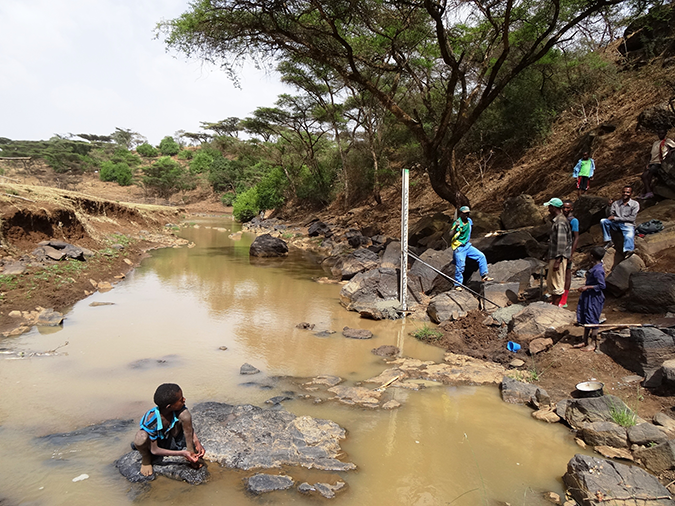Water security risk science: local knowledge for participatory resource management
Land degradation is a major cause of Ethiopia’s low and declining natural resource and agricultural productivity, persistent food insecurity, and rural poverty. This study aims to demonstrate water security for the poor can be improved through sustainable land management (SLM) interventions at community or micro-watershed scales.
The focus of the Catalyst project to-date has been on participatory monitoring at community scale as an approach to enhancing climate and hydrological monitoring, particularly for shallow groundwater.
The Accelerated project will build on this research to advance a methodology for monitoring the impacts of watershed management interventions using selected indicators of hydrological performance, and will develop a tool for targeting SLM interventions that increases groundwater recharge. The project will also aim to consolidate community engagement through a gender inclusive approach.
The project is partnered with the Ministry of Agriculture and Natural Resources (MoANR) which is the government agency responsible for implementing the Sustainable Land Management Programme (SLMP) throughout Ethiopia.
This project is one of five Accelerated Projects funded through our Partnership Funding.
REACH Stories of Change
REACH Story of Change: Participatory water resource management
Publications
Nigussie, L., Haile, A. T., Gowing, J., Walker, D., Parkin, G. (2020). Citizen science in community-based watershed management: an institutional analysis in Ethiopia. Colombo, Sri Lanka: International Water Management Institute. (IWMI Working Paper 191).
Gowing, J., Walker, D., Parkin, G., Forsythe, N., Haile, A. T., Ayenew, D.A. (2020) Can shallow groundwater sustain small-scale irrigated agriculture in sub-Saharan Africa? Evidence from N-W Ethiopia. Groundwater for Sustainable Development, 10.
Walker, D., Haile, A.T., Gowing, J., Forsythe, N., Parkin, G. (2019). Guideline: Selecting, training and managing para-hydrologists. REACH Working Paper 6, University of Oxford, Oxford, UK.
Walker, D., Haile, A. T., Gowing, J., Legesse, Y., Gebrehawariat, G., Hundie, H., Berhanu, D., and Parkin, G. (2019). Guideline: Community-based hydroclimate monitoring. REACH Working Paper 5, University of Oxford, Oxford, UK.
Nigussie, L.; Barron, J.; Haile, A. T.; Lefore, N.; Gowing, J. 2018. Gender dimensions of community-based groundwater governance in Ethiopia: using citizen science as an entry point. Colombo, Sri Lanka: International Water Management Institute (IWMI).

Dates
October 2017 – March 2019
Country
Ethiopia
Organisation
- Newcastle University
- International Water Management Institute (IWMI)
Blogs
Citizen science contributes to environmental management and water security in Ethiopia, July 2019
International Day of Rural Women, October 2018
